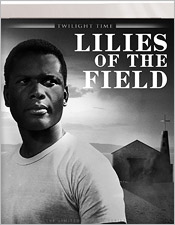Lilies of the Field (Blu-ray Review)

Director
Ralph NelsonRelease Date(s)
1963 (March 15, 2016)Studio(s)
United Artists (Twilight Time)- Film/Program Grade: A
- Video Grade: A
- Audio Grade: A
- Extras Grade: A
Review
Ralph Nelson’s Lilies of the Field (1963) is a remarkable film in its elegance and simplicity – it’s the kind of movie that should theoretically be slight and forgettable yet finds immense power in its subtlety. The story is relatively straightforward: a black handyman played by Sidney Poitier stumbles across a convent run by immigrant nuns while driving through the American southwest. He stops to take on what he thinks will be a one-day job fixing their roof and gradually finds himself staying on longer and longer, as the shrewd mother superior manipulates him into helping to build an entire chapel. There’s really not much more to the story than that, but in producer-director Nelson’s hands (working from a screenplay by James Poe), this minor fable yields major emotional effects – effects all the more potent because Nelson doesn’t force them.
Nelson was a gifted actor turned director (he fills both roles here, stepping in to play the one slightly racist character in the film) who should be better known than he is. A legend during the Golden Age of Television who worked concurrently with men like John Frankenheimer, Arthur Penn, and Rod Serling, Nelson made his mark with the 1956 TV presentation of Serling’s Requiem for a Heavyweight and a 1962 feature film adaptation. Both were highly acclaimed, but Nelson didn’t use his newfound clout after the movie version to cash in. Just the opposite, in fact – he poured all of his own money (and money he didn’t even have) into acquiring the rights to William E. Barrett’s slim novella The Lilies of the Field and producing it independently. He got a helping hand from Sidney Poitier, who agreed to forgo his usual salary in favor of a cut of the profits – a gamble that paid off handsomely not only in terms of remuneration but acclaim, as Poitier became the first black performer to win the Best Actor Academy Award.
Poitier is spellbinding in the movie, and the whole thing more or less rests on his shoulders – it’s hard to recall a scene in the picture that doesn’t feature him, and Nelson’s penchant for relaxed long takes demands an actor who can hold the frame with humor and gravitas in equal measures. Poitier is up to the challenge, but he has a lot of help, especially from cinematographer Ernest Haller. The black and white photography is stark and beautiful in equal measures – as stunning in its own completely different way as Haller’s Technicolor work in Gone with the Wind. Like everything else in the movie, the cinematography is beautifully crafted but unforced; it perfectly matches the restraint that infuses the performances and editing, elements that work in perfect harmony to create a movie that is moving without ever veering into unearned sentiment or cliché. And Haller’s work gets the presentation it deserves on Twilight Time’s Blu-ray, which is as fine a transfer as that company has ever released – which means it’s pretty much as good as Blu-rays get. Every nuance of Haller’s tonal range is perfectly preserved, along with a crisp, clear soundtrack (and, per Twilight Time custom, an isolated music and effects track for those who wish to study Jerry Goldsmith’s exemplary score). The disc also provides an outstanding commentary track by Twilight Time house scholars Lem Dobbs, Julie Kirgo, and Nick Redman, who do their usual bang-up job of presenting relevant aesthetic and historical analysis in an entertainingly conversational manner. It’s an audio narration worthy of the movie on which it comments, which in this case is really saying something.
- Jim Hemphill

